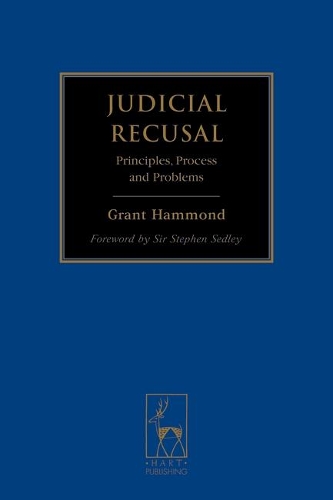
Judicial Recusal: Principles, Process and Problems
(Hardback)
Publishing Details
Judicial Recusal: Principles, Process and Problems
By (Author) R Grant Hammond
Bloomsbury Publishing PLC
Hart Publishing
27th July 2009
United Kingdom
Classifications
Professional and Scholarly
Non Fiction
347.014
Physical Properties
Hardback
208
Width 156mm, Height 234mm, Spine 16mm
Description
The doctrine of judicial recusal enables - and may require - a judge who is lawfully appointed to hear and determine a case to stand down from that case, leaving its disposition to another colleague or colleagues. The subject is one of considerable import and moment, not only to 'insiders' in the judiciary, but also to litigants and their lawyers. Understanding the principles which guide recusal is also to understand the fundamentals of judging in the common law tradition. The subject is therefore of considerable interest both at practical and theoretical levels, for it tells us most of what we need to know about what it means "to be a judge" and what the discharge of that constitutional duty entails. Unsurprisingly therefore, the subject has attracted controversy, and some of the most savage criticisms ever directed at particular judges. The book commences with an introduction which is followed by an analysis of the essential features of the law, the legal principles (common-law origins, the law today in the USA, UK and Commonwealth) and the difficulties which currently arise in the cases and by operation of statute. The third part looks at process, including waiver, necessity, appellate review, and final appeals. Three specific problem areas (judicial misconduct in court, prior viewpoints, and unconcious bias) are then discussed. The book ends with the author's reflections on future developments and possible reforms of recusal law.
Reviews
The book grapples with many difficult questions, including disclosure of interest, wavier, necessity and issues faced by appellate and final courts. It is thorough, wide-ranging and indeed fascinating. The writing is tight and there is a sense of contemporaneity, though the problem is timeless...Erudite and entertaining, it should also be read by those involved in our plethora of administrative tribunals and other quasi-judicial bodies; decision makers and commentators, politicians and journalists...Day-to-day adjudicators, lawyers and advocates will benefit from this commendable book. John Rowan QC New Zealand Law Journal December 2009 This is a handy little book. Cases in which a judge is asked to recuse often occur without much prior warning and it is good both for advocates and judges to be able to grab hold of a concise treatment of the subject to take to court to help one through the day. Mr Justice P W Young AO Australian Law Journal (2009) 83 ALJ 774 at 776 Grant Hammond has the advantage of being both a distinguished academic and a distinguished judge, as well as having been a successful practitioner. His learning is broad and deep, his analysis shrewd, his exposition lucid and his prose enjoyable. It's hard to ask more of a law book. From the foreword, Stephen Sedley, Royal Courts of Justice, London Hammond reviews future developments and possible reforms of recusal law in this splendid Hart publication which maintains the highest standards of intellectual legal titles. An eminently readable book ... to be welcomed for a much needed and highly lucid examination of a controversial and complex subject. Philip Taylor and Elizabeth Taylor (Richmond Green Chambers) This work is a real and meaningful contribution to an area of law which in the Commonwealth lacks cohesion He has provided a rigorous analysis of the issues and laid out in some detail the pitfalls and possible paths forward in this area. As a former academic, lawyer, and now a senior appellate judge, he brings a considerable experience to bear on the issues. An enormous breadth of knowledge which is lacking in much modern legal writing This work will be an invaluable resource for judges considering, as well as litigants and lawyers bringing or opposing, recusal applications. Duncan Webb NZ Lawyer Magazine Issue 129, 5/2/2010 The ... analysis is as readable as it is erudite and comprehensive, encompassing the substantive, theoretical and practical questions that one would expect to find in a learned treatise on the subject - and more. The book is a notable contribution to the literature on recusals, and should be of considerable interest to public lawyers and judiciary watchers. A brief review of this nature could not sufficiently comment on such excellent scholarship. Hammond has written an excellent book that should engage scholars, judges and policy-makers alike. Recusal law is much the richer for it. Abimbola Olowofoyeku Cambridge Law Journal 69, 1, March 2010 The book is a worthwhile purchase. It is very readable and generally concise. Robert Howard Law and Politics Book Review May 10, 2010 Useful, succinct and intelligent new monograph. The layout of the book is simple and sensible Michael Crowell Public Law October 2010 Hammond provides a well researched and readable examination of judicial recusal which easily fills what was a surprising gap in the extensive literature of public law in the common law world. The breadth of comparative material gathered by Hammond enables the book to provide a useful resource for judges and practitioners faced with the issue. Matthew Groves Australian Journal of Administrative Law Volume 18, 2011
Author Bio
Grant Hammond is a Judge of the Court of Appeal of New Zealand. Before becoming a judge he was Dean of the University of Auckland Faculty of Law, has taught in Canada and the USA as a Professor of Law, and before that worked in private practice in New Zealand.
